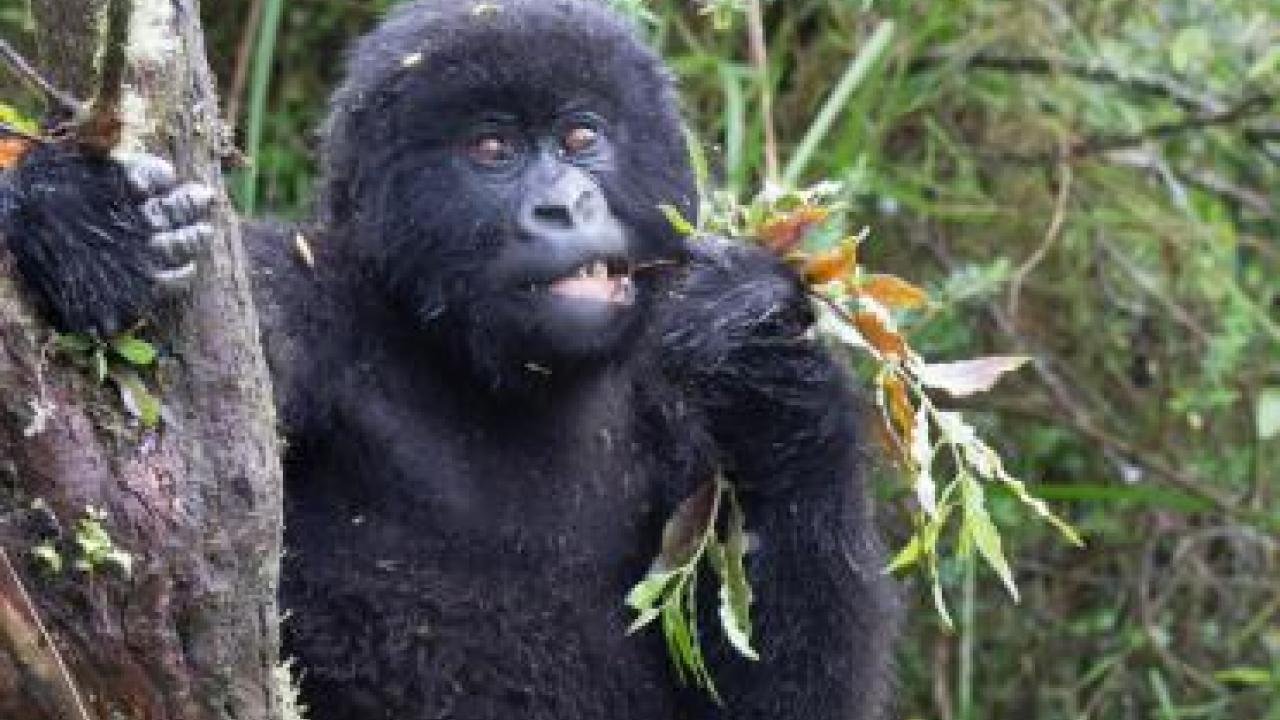
Genetic Similarities in ACE2 Receptor Likely Made Zoo Gorillas Vulnerable to SARS-CoV-2
By Lisa Howard, UC Davis Research
On Jan. 11, the San Diego Zoo announced members of its gorilla troop had tested positive for SARS-CoV-2, the first known instance of natural transmission to great apes. Two gorillas had begun coughing Jan. 6. The presence of virus in the troop was confirmed by testing fecal samples.
The Gorilla Doctors program, affiliated with the UC Davis School of Veterinary Medicine, monitors the health of wild mountain gorillas in central Africa. Gorillas are susceptible to other human respiratory diseases and may be at risk from COVID-19.
Gorillas, of course, are among our closest relatives and share many genetic similarities with humans. One particular similarity has likely made them vulnerable to COVID-19: the gene coding for angiotensin-converting enzyme-2, or ACE2.
ACE2 is the main receptor site for SARS-CoV-2, the novel coronavirus that causes COVID-19. It is found on epithelial cells that line the nose, mouth and lungs, among other locations. The virus engages with ACE2 through its surface “spike protein,” allowing it to attach to and enter cells. A sequence of 25 amino acids within the human ACE2 protein are crucial for this binding to occur.
Survey of species ACE2 proteins
Last year, an international team of researchers led by Joana Damas, postdoctoral researcher at UC Davis and Harris Lewin, distinguished professor of evolution and ecology at UC Davis, published a survey of the ACE2 protein sequences of 410 species of animals including birds, fish, amphibians and reptiles. They discovered that many animals, including gorillas, share the same amino acids on their ACE2 receptors as humans, likely leaving them potentially vulnerable to the SARS-CoV-2 virus.
In their work, published in August 2020 in Proceedings of the National Academy of Sciences, the researchers predicted that the risk of infection with the novel coronavirus would decrease the more each species’ ACE2 amino acids differ from those of humans. They noted, though, that the virus may utilize a different receptor in other species. The San Diego Zoo was one of the many institutions that contributed genomic material for the study.
Monitoring wild gorillas
Wild gorillas are susceptible to human respiratory diseases, according to Gorilla Doctors, a program affiliated with the Karen C. Drayer Wildlife Health Center at the UC Davis School of Veterinary Medicine. So far, however, there is no evidence of wild gorillas contracting SARS-CoV-2, according to a Jan. 12 blog post from Gorilla Doctors. The organization has added the novel coronavirus to their regular monitoring of the animals’ health, mostly by fecal sampling.
In addition to Western Lowland gorillas, a number of other endangered and critically-endangered primates are predicted to be at high risk of contracting COVID-19 based on their ACE2 protein sequence including bonobos, chimpanzees, and orangutans.
The risk of contracting COVID-19 is not limited to primates, however. A few other animals flagged as high risk in the survey include marine mammals such as gray whales and bottlenose dolphins. Domestic animals such as cats, cattle and sheep were found to have medium risk, and dogs, horses and pigs were found to have a low risk based on ACE2 binding.
In practice, there have been sporadic reports from around the world of cats and dogs (including big cats in zoos) being infected with SARS-CoV-2, as well as some cases in mink farms. There is no evidence of cats, dogs or other domestic animals transmitting the virus to humans, according to the UC Davis School of Veterinary Medicine.
More information
Genomic Analysis Reveals Many Animal Species May Be Vulnerable to SARS-CoV-2 Infection (UC Davis News)
Gorilla Troop at San Diego Zoo Safari Park Test Positive for COVID-19 (San Diego Zoo news release)
Captive Western Lowland Gorillas Proven Susceptible to COVID-19 (Gorilla Doctors)
FAQs for Pet Owners during the COVID-19 Pandemic (UC Davis School of Veterinary Medicine)
Lisa Howard is a writer with the UC Davis Office of Research.
